Frequently Asked Questions - Oxygen Therapy
As you prepare for the discharge of your loved one from hospital, there may be a requirement for you to have an oxygen supply at home. The attending doctor or nurse may have informed you to prepare oxygen equipment for the patient, and probably gave you some recommendations as well. This could be your first time renting or buying such medical equipment, and you may have questions about the items and process.
Here are some of our frequently asked questions:
What are the different types of oxygen therapy available?
There are 3 main types of oxygen equipment: Oxygen Concentrators, Oxygen Cylinders and Portable Oxygen Concentrators.
What is an Oxygen Concentrator?
An oxygen concentrator draws oxygen from the air, and concentrates the oxygen into 90% - 95% purity. There is no refilling or top up required for an oxygen concentrator, and it requires a power supply to operate.
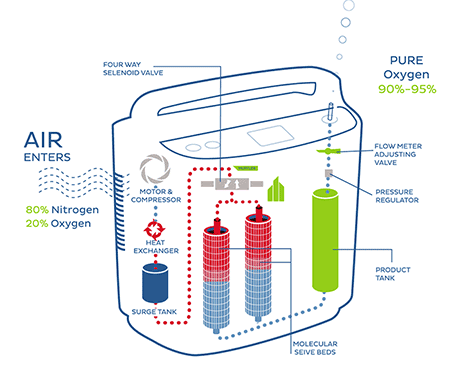
Is the Oxygen Concentrator easy to use?
Yes, there is an on/off switch at the front of the concentrator, and a flow regulator to set the oxygen rate.
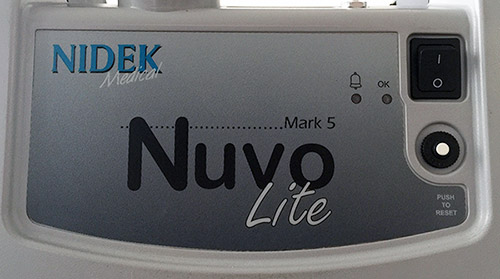
What is the maintenance required?
There is a dust filter at the back of the oxygen concentrator that needs to be washed weekly. We also recommend that the oxygen concentrator is serviced at least once a year.
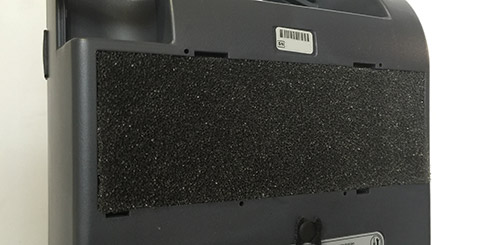
How long can the Oxygen Concentrator be used for?
The oxygen concentrator is designed to run 24 hours, so as long as you have a power supply, the oxygen concentrator will keep giving oxygen. It is recommended to seek the advice of a medical professional about oxygen flow rates and usage times.
Should a Humidifier be used?
It is not necessary to use a humidifier with the oxygen concentrator. Use a humidifier when you feel that the air is too dry for your comfort. If you do use a humidifier, it is advised to fill it up with distilled water, and the distilled water should be replaced daily.
Can the Oxygen Concentrator be moved around?
Yes, there are wheels at the bottom of the oxygen concentrator so you can move it around your home. As long as there is a power socket nearby, you may continue to use the oxygen concentrator.
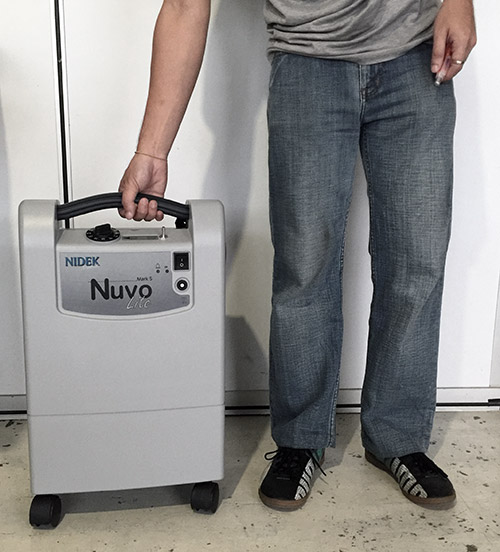
What is an Oxygen Cylinder?
An oxygen cylinder is an oxygen tank that stores pressurized oxygen, and the capacity of a standard D sized cylinder is about 400 litres.
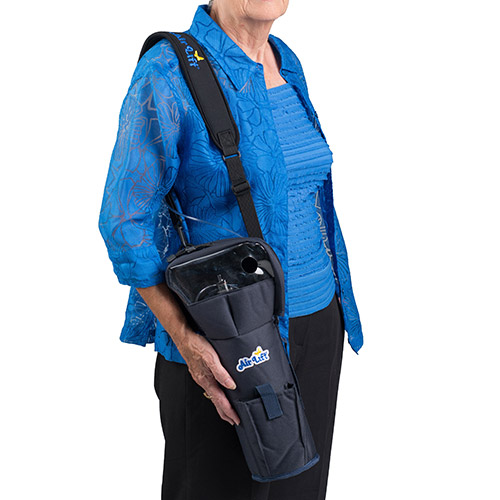
How long does an Oxygen Cylinder last?
If you use, say 2 litres per minute of oxygen, the oxygen cylinder will last you about 3 hours. The higher the flow of oxygen, the faster the oxygen in the tank will run out, and a refill would be required.
What is the weight of an Oxygen Cylinder?
The Oxygen Cylinder is relatively lighter, at about 3 kg.
What is a Portable Oxygen Concentrator?
A Portable Oxygen Concentrator, or POC, has a rechargeable internal battery, and can be operated via power supply as well. Usually the POC works on a pulse dose basis and delivers oxygen when a breath is detected.
What is Pulse Dose and Continuous Flow?
Standard oxygen concentrators provide a constant flow of oxygen, or continuous flow. As POCs are smaller in size, it becomes limited to provide oxygen only on a pulse dose basis. When you take a breath, the POC detects it and releases a dose of oxygen.
Can the Portable Oxygen Concentrator be used all the time?
It is recommended that the user is consciously awake while using a POC. We do not advise the POC to be used during sleep as breathing becomes shallower and the POC may not be able to detect the breaths consistently.
Can I travel with the Portable Oxygen Concentrator?
Yes, the POC was designed to be brought together during travels such as road trips or overseas air travel. The POC is FAA approved and can be taken on board an aircraft. However, please seek approval with the various airlines that you are travelling on before bringing the POC on board.
Who should consider the Portable Oxygen Concentrator?
Users who do not depend on oxygen all the time and would like to keep an active lifestyle should consider the POC. Although the cost of ownership for a POC is relatively higher, it may be more economical in the long run as compared to an oxygen cylinder with regular refills.
How can I get more help and recommendations?
Our recommendations depend from user to user.
If the requirement is only for a standby basis, perhaps an oxygen cylinder would be more cost effective, as rental prices for oxygen cylinders are usually lower than oxygen concentrators. However, if it is expected that the oxygen intake would be on a daily basis, even for 30 minutes a day, it would be more economical to obtain an oxygen concentrator.
Everyone has different needs, and no 2 users have the same requirements. Talk to us today and we would do our best to assist you for your oxygen therapy needs.


